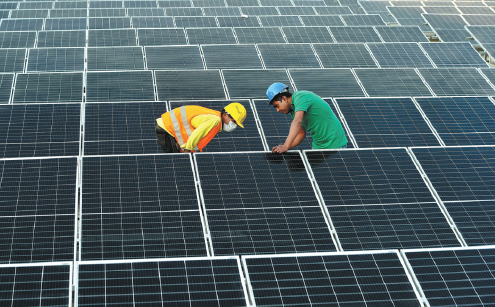Bangladesh shrugs off personal debt trap fear, lauds Chinese ODI

Image: Collected
Amid infrastructure boost, minister says bilateral relations are win-win
Chinese investment on Bangladesh increased significantly from 2016 to 2020, especially in large infrastructure projects. In the next stage, Bangladesh expects to check out more expenditure from China in the developing sector, said persons with know-how of the matter.
The Belt and Highway Initiative gained traction in Bangladesh when Chinese President Xi Jinping visited the united states in 2016.
A number of agreements were signed between the two nations under which $40 billion investment was envisaged, including $24 billion in bilateral infrastructure investment, said Naser Ezaz Bijoy, CEO of Normal Chartered Bangladesh.
Info from the Bangladesh Expenditure Development Authority show that foreign direct expense from the Chinese mainland reached $80.29 million during 2019-20, and FDI proposals from the mainland at the BIDA were $9.12 billion for 521 projects.
Chinese investors are lively in a number of sectors, including power, textile and garment, leather, trading and construction, the BIDA said.
Bangladeshi Setting up Minister MA Mannan said Chinese purchase and rich experience in infrastructure development provides a lot of advantages to Bangladesh whose infrastructure gap is still very huge.
The investment may also satisfy Bangladesh's desire for growth in the energy sector, specially the green power segment.
In his view, Bangladesh is an effective choice for China to relocate the source chain of its manufacturing industry. The world's second-largest market will pursue higher level of manufacturing technology, which move may make more opportunities available for Bangladesh, Mannan said.
The South Asian country is doing well in the low category of technology over the last couple of years. Now, additionally it is changing, with the aim of joining the bigger technology group by 2041, he said.
The year 2041 marks the finish of the country's second perspective plan that starts this season.
Even though some Westerners accuse China of pushing Bangladesh right into a "debt trap", Mannan said he is not concerned about the issue.
"When there is any monetary problem with any particular financial transaction between authorities to government, there are guidelines to stay the problem.
"We are not afraid of a personal debt trap because we don't believe it exists. Also if there exists a problem, sometimes due to misunderstanding or misinformation, we (Bangladesh and China) would generally sit back and settle the challenge by discussions like friends," he said.
Besides, Bangladesh's external personal debt to GDP is just about 15 percent, which isn't a high credit debt level, said Bijoy in Standard Chartered.
"Compared to various countries, Bangladesh is in an exceedingly strong position regarding the debt circumstance. Although its credit debt level will rise somewhat as China increases expenditure in the united states, the return on investment in the long run will be a lot more rewarding," he said.
Both countries have progressed drastically on investment in the public sector, plus they are now seeing an evergrowing interest of investment in the private sector.
"We will be seeing a whole lot of prospects to collaborate in the info and communications technology sector. Aside from financial investment, gleam large amount of technical knowledge that may be imported to Bangladesh, and Chinese companies can earn loyalty service fees and technical costs. These could be mutually useful," said Bijoy.
Bangladesh is wanting to eliminate intensive poverty and reach higher middle-income country status by 2031, and high-income country position by 2041 with poverty approaching eradication.
It means that Bangladesh's market is to improve ninefold to $3 trillion in twenty years, and the united states will increase its urbanization level from 35 percent currently to 65 percent by 2041.
The additional thirty percent urbanization that will happen affects a population of more than 50 million residents, said Bijoy.
Chinese companies are highly knowledgeable in residence relocation, urban development and related constructions, so there is usually huge prospect of China and Bangladesh to attain mutual benefits, he said.
Source: http://epaper.chinadaily.com.cn